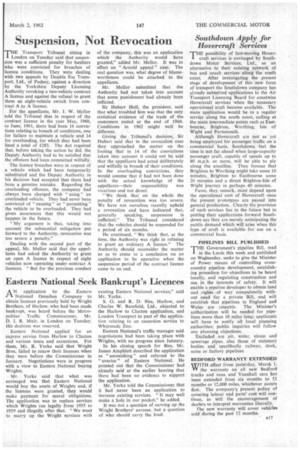Suspension, Not Revocation
Page 53

If you've noticed an error in this article please click here to report it so we can fix it.
THE Transport Tribunal sitting in I London on Tuesday said that suspension was a sufficient penalty for hauliers who were convicted for breaches of licence conditions. They were dealing with two appeals by Double Ess Transport, Ltd., of Pudsey, against a direction by the Yorkshire Deputy Licensing Authority revoking a two-vehicle contract A licence and against the refusal to grant them an eight-vehicle switch from contract A to A licence.
For the appellants, Mr. J. W. Mellor told the Tribunal that in respect of the contract licence in the year May, 1960, to June, 1961, there had been 16 convictions relating to breach of conditions, one for failure to maintain a vehicle and 14 for overloading, for which they had been fined a total of £283. The Act required that, before taking the action he did, the Deputy Authority had to be satisfied that• the offences had been committed wilfully-.
The licence breaches were in respect of a vehicle which had been temporarily substituted and the Deputy Authority in his decision had accepted that there had been a genuine mistake. Regarding the overloading offences, the company had always been charged with " using " an overloaded vehicle. They had never been convicted of " causing" or "permitting" the vehicle to be overloaded. They had given assurances that this would not happen, in the future.
"My argument is that, taking into account the substantial mitigation put forward to the Authority, revocation was too severe a penalty."
Dealing with the second part of the appeal, Mr. Mellor said that the appellants had asked the Authority to grant an open A licence in respect of eight vehicles now operating under contract A Licences. "But for the previous conduct
of the company, this was an application which the Authority would have granted," added Mr. Mellor. It was in effect an "Arnold appeal" ease. The real question was, what degree of blameworthiness could be attached to the appellants.
Mr. Mellor submitted that the Authority had not taken into account that some punishment had already been inflicted.
Sir Hubert Hull, the president, said that what troubled him was that the only statistical evidence of the trade of the customers ended at the end of 1960. Conditions in 1962 might well be different.
Giving the Tribunal's decision, Sir Hubert said that in the revocation case they approached the matter on the footing that in 14 of the convictions taken into account it could not be said that the appellants had acted deliberately and wilfully in breach of their conditions. In the overloading convictions, they would assume that it had not been done with the actual knowledge of the appellants—their responsibility was vicarious and not direct.
"We think that on the whole the penalty of revocation was too severe. We have not ourselves recently upheld a revocation and have indicated that, generally speaking, suspension is sufficient." The Tribunal considered that the vehicles should be suspended for a period of six months.
He continued, "We think that, at the time, the Authority was right in refusing to grant an ordinary A licence." The Authority should reconsider the matter so as to come to 'a conclusion on an application to be operative when the suspension period of the contract licence came to an end.




















































































































































